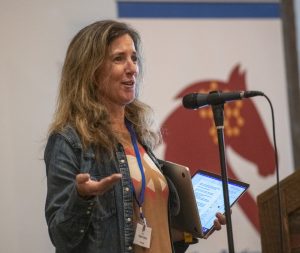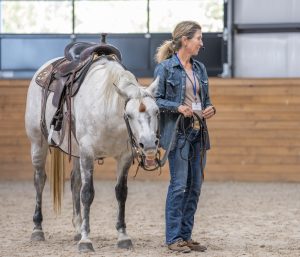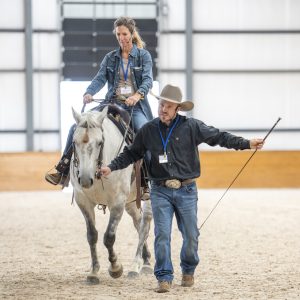
Katrin Silva tells a story during the evening Storytelling Session at the Best Horse Practices Summit
Editor’s Note: Best Horse Practices Summit presenter Katrin Silva grew up riding dressage in Germany before moving to the United States at age 19 to learn to ride Western. She’s been riding both disciplines for the last 20 years and is a regular guest columnist for Cayuse Communications. The author of Dressage for All of Us: How to Help Any Horse Become a Happier, More Responsive Riding Partner and the forthcoming Ride with Feel: A Guide for the Rest of Us lives in New Mexico where she works with dressage and Western clients.
Katrin Silva writes:
I started riding horses as a kid and rode purely for the enjoyment. I spent every spare minute at the barn, hopping on horses no one else wanted to ride, just so I could ride. My only goal was to spend as much time as I could on a horse’s back. I rode because it made me happy. I needed no reason, no measure of success other than the connection with the horse.

Silva at the 2022 Summit
Twenty years later, things had changed. I still wanted to ride horses all day, every day, but now had other goals, too, like the real and undeniable need to make a living. The clients who trusted me to work with their horses wanted tangible results in exchange for money, so I focused on these results. My ambitions as a young professional clustered around competitions. Success meant the achievement of clearly outlined extrinsic goals: placing at a show, earning a USDF medal, getting a score above 65. I believed no other way defined success, so I did not bother to look for one.
This did not mean I had stopped loving horses. While I made plenty of ignorant mistakes, being fair to every horse was as important to me back then as it is now. But being fair had nothing to do with how successful I felt. A judge’s or clinician’s verdict, on the other hand, meant everything. One negative comment had the power to destroy my confidence. Positive feedback from a horse or a client meant comparatively little. Predictably, I felt like a failure much of the time!
I am 52 years old and, compared to my colleagues, have not achieved much in the dressage ring: I’ve never shown above 4th Level and am still two scores away from my USDF silver medal.
But, thankfully, my definition of success has changed. Here are the essential questions I ask myself every day. Their honest answers now define how successful I feel about my work:
- Did I get on each horse with an agenda and expectations of my own, or did I take the time to feel, to listen to the horse’s side of the conversation before determining how today’s training session would look?

Silva and Josh Nichol at the 2022 Summit
Success means meeting every horse where he is, today, at this moment. Success means letting go of my ego and letting the horse tell me what he needs.
- Did I just go through the motions while working with each horse, or did I get off a slightly more balanced, more athletic, more aligned, more confident, more focused horse than the one I got on?
Success means making tiny bits of progress every day. They add up over time.
- Did I use the tools I have to the best of my ability or did I become sloppy? Did I show up for every horse with focus and empathy? Did I give every horse and every student my full attention?
Success does not mean I’m perfect. It means I keep trying. It means I keep learning.
- Did I enjoy the ride? Ultimately, I realize that I have known the most important measure of success all along: I don’t enjoy riding a tense, weak, anxious, or unbalanced horse.
I enjoy riding a relaxed, strong, straight, confident athlete – or a horse who is moving in that direction, slowly, but surely. My horses – and my clients – seem happy with this approach, too.
How do you define success? I’m curious. Let me know!
I feel your sentiments in my own experience. I’m so grateful that I grew up with horses in my backyard and not a horse show in sight except for maybe the occasional 4H show that my Appaloosa friends would take me to. If I had not had this background, I would not have had the experience of horses to return to after hitting the dressage horse show scene in my 20’s. I experienced early success showing my TB which made me strive for more. Then there was a shift when the warmbloods came ashore and judges seemed to just be looking at the gaits and not so much the correct way of going and harmony. I became overly focused on this too and shows became stress inducers of perfection. I’ve come back around to the relationship with the horse in my riding while still having goals. There was a lot of letting go, mentally and physically.
Thank you for sharing your story., Lisa. I think we went through similar experiences in the dressage ring. I started showing in the 1990s, on a 14.2 Morgan, and a couple of Quarter Horses. I did pretty well for a while, but then, lilke you say, the Warmbloods came and I was last in every class. Very discouraging. If I competed at recognized dressage shows on these horses now, I’d be laughed out of the ring.
Thank you for this honest, heart-felt information. This is how I want to approach my horses each day.
Thank you for this honest, heart-felt information. This is how I want to approach my horses each day.